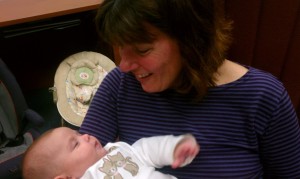“What are some things to say to a baby when he is upset for no clear reason (fresh diaper, fed, not too cold/warm, not tired, etc)? My husband and I have gotten into the habit of saying ‘You’re OK’ to our 3 month old. We say it more as a reassurance that he is indeed safe and secure (which we frequently also say) rather than to negate his feelings. I’m at a loss for other phrases to use but don’t want this one to become any more of a habit, especially for when he is older.”
“I see you as the separate little person that you are. You know and feel things that you want and need to express. You want and need to be heard. You have a lot to say. I see you. I hear you. I’m listening. I want to hear and understand who you are and what you have to say. Tell me. I am here for you.” This is a conversation and relationship that begins at birth and evolves over time. You convey this message to your young baby through your words, through your touch, through maintaining an attitude of curiosity, openness, and respect.
“Remember, crying is a baby’s language—it is a way to express pain, anger, and sadness. Acknowledge the emotions your baby is expressing. Let him know he has communicated.
For example, you might say, ‘I see you’re uncomfortable. And hearing you cry really upsets me. I want to find out what you need. Tell me. I will try to understand your cues…’… Then think out loud. ‘Could it be that your diaper is wet? I don’t think you are hungry because you just ate. Maybe I’ve been holding you long enough and maybe you want to be on your back for a while.’ This is the start of lifelong, honest communication.” Magda Geber
I remember the first time I held my girl as if it was yesterday, even though that was two and a half years ago. She was just a few weeks old. As soon as she was placed in my arms, she began vocalizing. This was something that everyone present would notice and comment on over a period of four months, during the precious one hour visits we were allowed weekly. “As soon as she is in your arms, she starts “talking”.
This is still true today, although now she has words. She lets me know how she’s feeling and what she’s thinking, in a very clear way, always. We don’t always agree. I’m not always able to make things better or easier for her. Sometimes, all I can do or say is, “I hear you. This is hard.” Sometimes, I have misunderstood, and gotten it wrong. But we have always been and are always) in conversation with each other and my goal has always been (and still is) to try to listen and understand, and to allow her to feel heard, seen and accepted for exactly who she is. It’s an attitude and a belief as much as anything else. “I am interested in hearing what you have to say and trying to understand who you are and what you need.”
Early on, I said things like this: “What do you want to tell me?” “Tell me more.” “You are so upset.” “I’m listening.” “I’m here.” “You have a lot to tell me.” “You seem uncomfortable.” “I wonder what you’re trying to tell me?” “It’s OK to cry.” ” I wonder if you would like to go outside for a walk?”” I wonder if you are tired and need to rest?” “Would you like me to sing you a song?” “It’s hard to be a baby sometimes, isn’t it?” “I’m trying to/want to understand what you’re telling me.”
Enter into the conversation with your baby. Let her know that what she has to say is important to you, and that you are trying to understand. Ask her questions and wait for her response. Be with her in her experience as fully as you are able. It’s the beginning of a beautiful relationship, and a lifetime of conversation.


Incredibly beautiful post, Lisa. This is so simple, and yet… being able to hold this space for our children, at any age, is one of the biggest challenges of parenting. You and R are both so lucky to have each other!